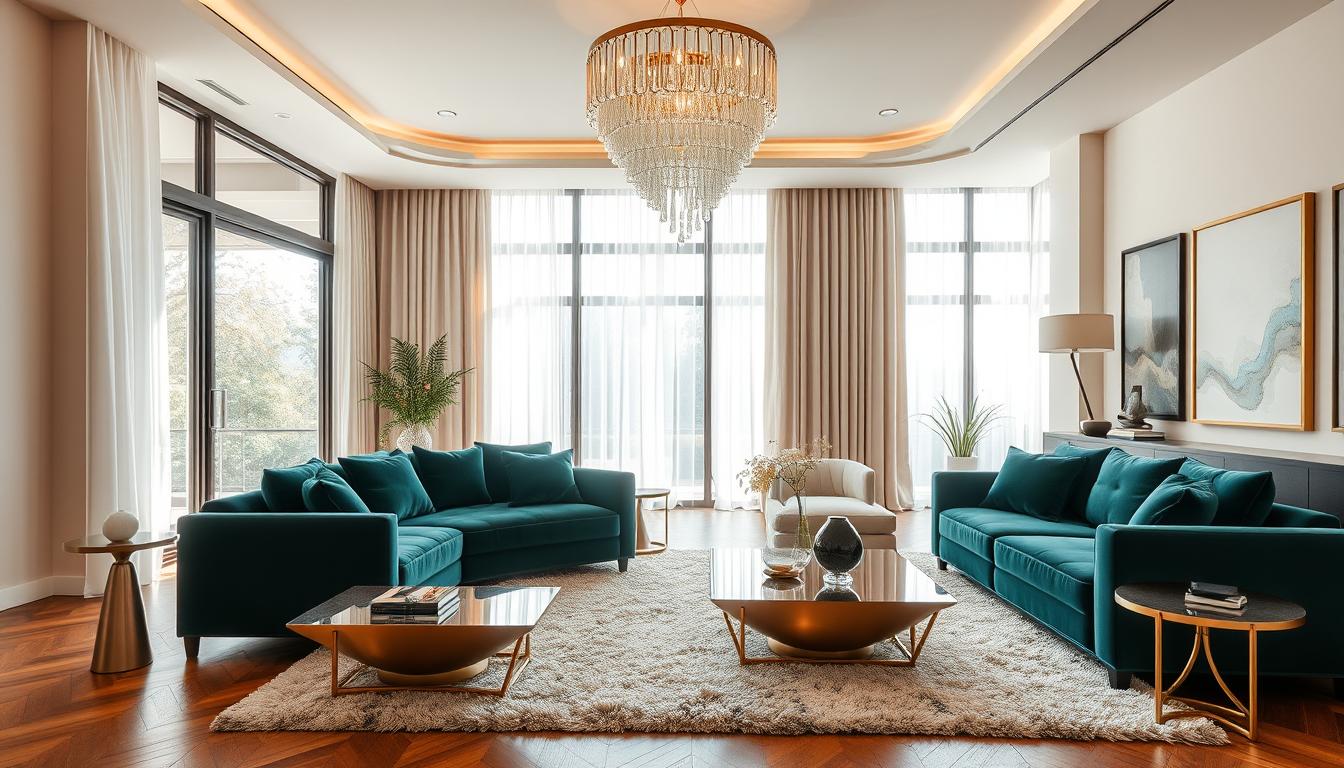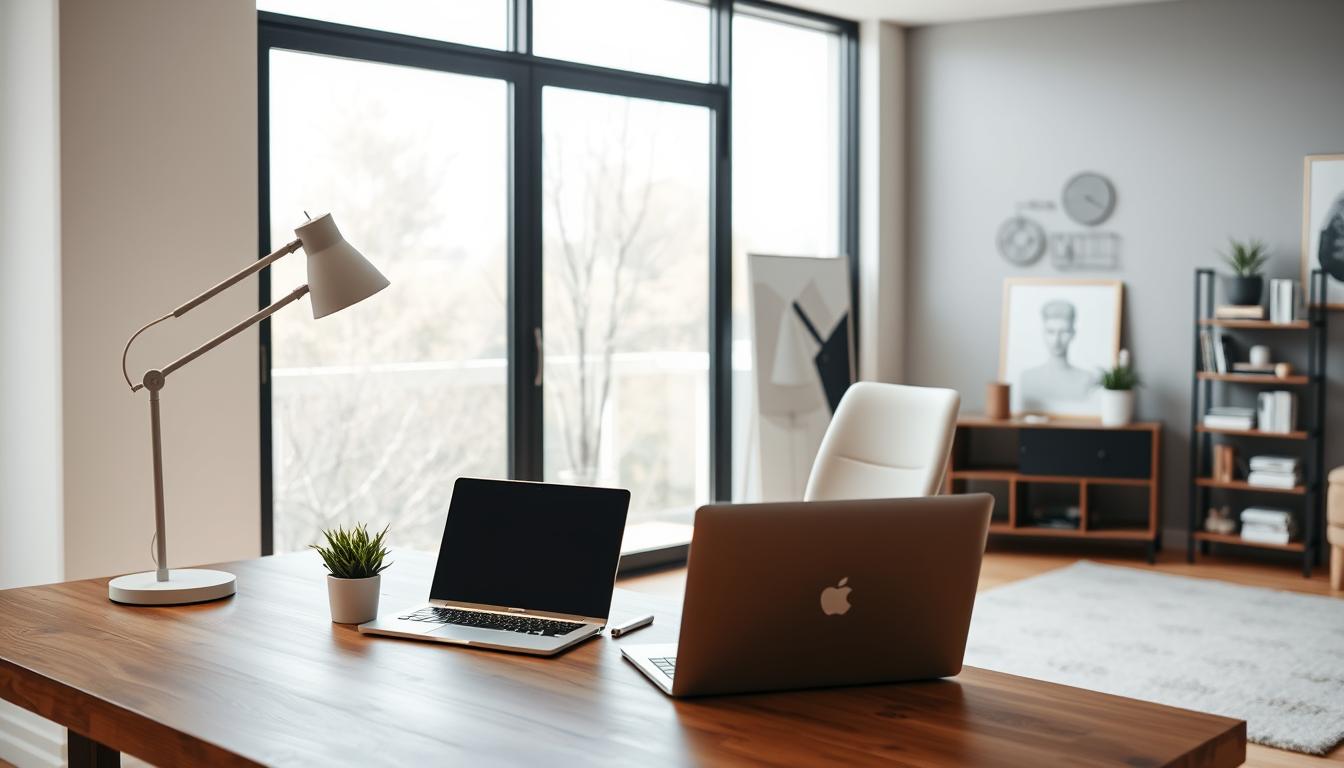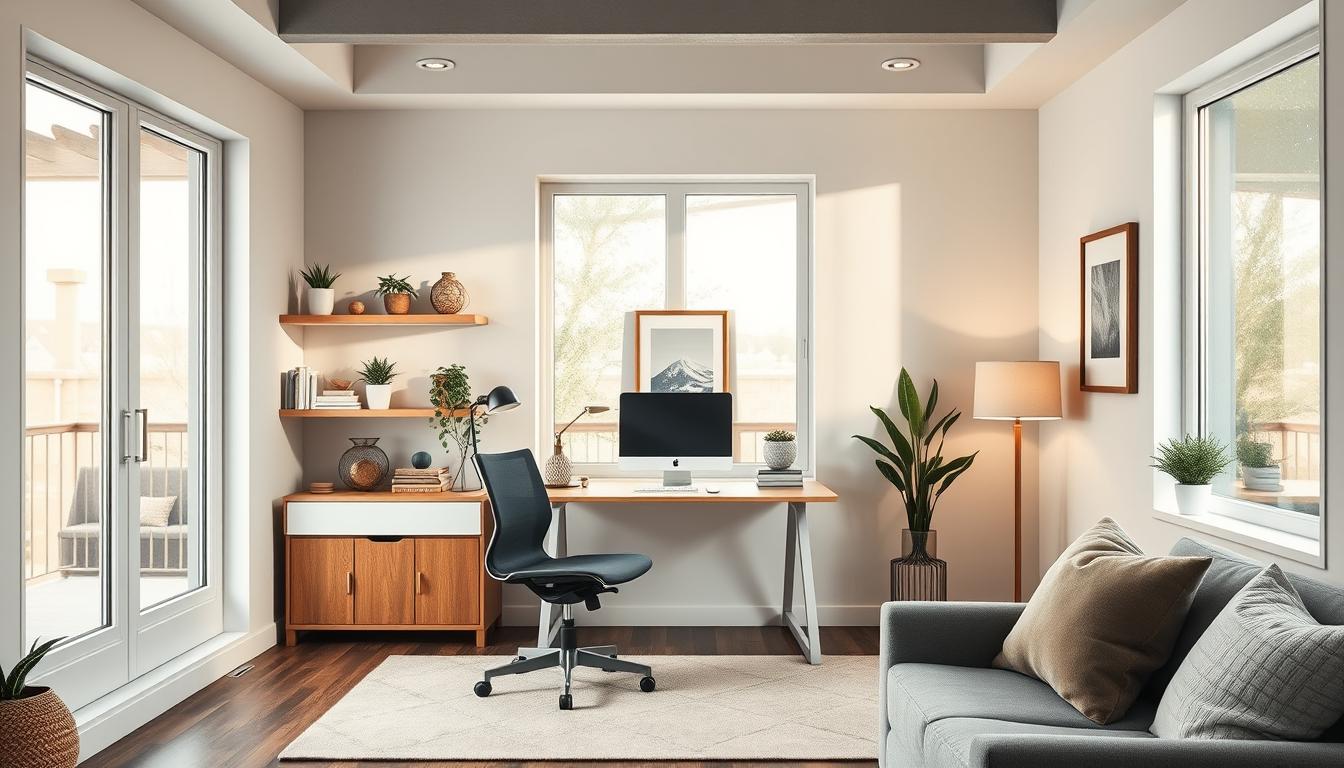As we enter 2023, the world of modern interior design is buzzing with new ideas. These ideas aim to change how we live at home. We’ve found 35 popular home decor styles that people are looking forward to in the new year.
We’re looking at the top home interior design trends for this year. Trends like using sustainable materials and adding smart technology are big. We’ll explore these design trends that promise to improve our homes.
Key Takeaways
- Sustainable materials are becoming increasingly popular in modern interior design.
- Smart home technology is being incorporated into popular home decor styles.
- There’s a growing emphasis on personal expression in home interior design trends.
- 35 design and remodeling trends are expected to shape the industry in 2023.
- Homeowners are looking for ways to make their living spaces more eco-friendly.
Embracing Sustainable Materials in Design
In 2023, home design is moving towards being more eco-friendly. People are choosing green options because they care about the planet. This change is big.
Joshua Smith, a top designer, says, “More people want to buy things that are good for the environment. They ask about the item’s origin and production.” This shows a big interest in using sustainable materials in homes.
The Rise of Recycled and Upcycled Furnishings
Using recycled and upcycled items for furniture is becoming popular. Recycled materials are turned into cool, one-of-a-kind pieces. This cuts down on waste and makes homes unique.
For example, old pallets are made into coffee tables. Vintage doors are turned into wall art. It’s a creative way to reuse things.
Eco-Friendly Fabrics and Textiles
Choosing eco-friendly fabrics is key in sustainable design. Fabrics like organic cotton, hemp, and recycled polyester are in demand. They’re good for the planet and look great too.
Natural Stone and Wood Elements
Natural stone and wood are still favorites in green design. They add warmth and realness to spaces. Reclaimed wood is special because of its history and texture. It makes any room feel richer.
| Material | Sustainability Features | Design Benefits |
|---|---|---|
| Recycled Metal | Reduces waste, conserves resources | Unique, modern aesthetic |
| Organic Cotton | Eco-friendly, biodegradable | Soft, natural texture |
| Reclaimed Wood | Reduces demand for new lumber, retains history | Warmth, character, and story |
Using these green materials lets homeowners design stylish, eco-friendly homes. As this trend grows, we’ll see even more creative uses of sustainable materials in design.
Bold Color Palettes Making a Comeback
This year, people are using bold colors to make their homes stand out. Nicole Hirsch, Founder of Nicole Hirsch Interiors, says, “We’re seeing lots of deep wall colors, like in bathrooms. Color is really in this year!”
Bold colors do more than just brighten a room. They show off the homeowner’s style. Whether it’s bright colors or natural tones, the goal is to make a bold statement.
Vibrant Hues vs. Earthy Tones
The choice between bright colors and natural tones is a big one. Bright colors like emerald green and sapphire blue add luxury. Earthy tones like terracotta and moss green bring warmth and coziness.
Think about what look you want. Bright colors are great for a modern vibe. Natural tones are better for a cozy, organic feel.
Accent Walls as Statement Pieces
Accent walls are a smart way to add bold colors without overwhelming a room. Painting one wall in a bold color creates a focal point.
This method is not only pretty but also lets you get creative. You can pick a color that matches your decor or contrasts it, depending on what you want.
The Heat of Warm Colors in 2023
Warm colors are back in 2023, making spaces feel cozy and lively. Colors like warm reds and oranges turn rooms into welcoming places.
To use warm colors well, follow the 60-30-10 rule. Use 60% of the room in a main color, 30% in a secondary color, and 10% in an accent color. This keeps the space balanced and attractive.
| Color Type | Popular Shades | Best Used In |
|---|---|---|
| Vibrant Hues | Emerald Green, Sapphire Blue | Modern Living Rooms, Accent Walls |
| Earthy Tones | Terracotta, Moss Green | Rustic Kitchens, Cozy Bedrooms |
| Warm Colors | Warm Reds, Inviting Oranges | Dining Areas, Family Rooms |
Multifunctional Spaces: A Growing Necessity
Homes are now the center for both work and fun. This makes multifunctional spaces more important than ever.
Remote work has changed how we use our homes. Bob Bakes, Co-Founder of Bakes & Kropp, notes a rise in modern kitchen designs. He talks about “soft-modern kitchen design,” blending warmth with modern touches.
Designing for Work from Home
Creating spaces for work-from-home is key. These areas need to be comfy, well-lit, and free from distractions. Using current interior decorating styles like minimalism can boost productivity.
Flexible Furniture Solutions
Flexible furniture is essential in multifunctional spaces. Items like storage ottomans or desks with shelves are great. They save space and help keep areas tidy, making it easy to switch tasks.
Creating Spaces for Family and Leisure
Multifunctional spaces should also support family and leisure. Design areas that can change, like a living room that turns into a play area or gym. The goal is to balance function and comfort, making the space welcoming for all activities.
By focusing on multifunctional spaces, homeowners can make areas that are both beautiful and practical. They can adapt to changing needs with the right flexible furniture and design.
Biophilic Design: Bringing the Outdoors In
The trend of biophilic design is growing, as people want to connect with nature again. This design idea links humans with nature, improving health and sustainability.
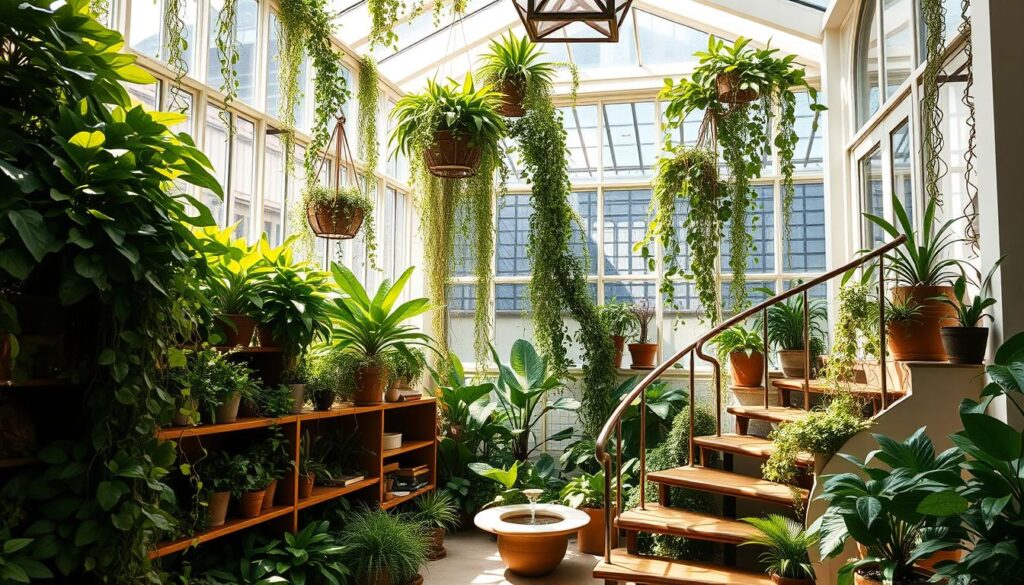
Incorporating Indoor Plants and Greenery
Using indoor plants is a simple way to add biophilic design to our homes. Plants clean the air, boost health, and add beauty. There are many plants that can live indoors, depending on the light they get.
Creating a green wall or a botanical corner is a great idea. These spots are beautiful, clean the air, and calm us down.
Natural Light and Open Spaces
Bringing in natural light is key in biophilic design. Big windows, skylights, and mirrors help reflect light and make spaces feel bigger. This reduces the need for artificial light and connects indoors with outdoors.
- Install larger windows or sliding glass doors to bring in more natural light.
- Use mirrors strategically to reflect natural light and illuminate darker areas.
- Consider installing skylights or solar tubes to channel natural light into interior spaces.
Using Organic Shapes and Forms
Using organic shapes in our decor mimics nature. This can be done with furniture, natural stone, or wooden elements.
| Material | Description | Biophilic Benefit |
|---|---|---|
| Natural Stone | Used in flooring, countertops, and decorative elements. | Brings the earth’s natural beauty indoors. |
| Reclaimed Wood | Used in furniture, flooring, and wall paneling. | Adds warmth and a sense of history to a space. |
| Rattan and Wicker | Used in furniture and decorative items. | Provides a natural, organic feel to interiors. |
As we embrace biophilic design, our homes become part of nature. Adding plants, natural light, and organic shapes makes our spaces better for our health and connects us to nature.
Nostalgic Design Trends Resurfacing
Interior design is seeing a big comeback of old trends. Our homes are now mixing classic and modern styles. Gideon Mendelson, Founder of Mendelson Group, says, “Design with nostalgia in mind will keep growing. It’s moving from granny-chic to a more sophisticated look.”
Mid-Century Modern Revival
The mid-century modern style is back in a big way. It’s known for clean lines, organic shapes, and simplicity. This style, popular in the 1950s and 60s, now uses modern materials and tech.
- Iconic furniture pieces with a retro flair
- Use of natural materials like wood and leather
- Statement lighting fixtures that blend form and function
This mix creates a space that feels both old and new.
Vintage Meets Contemporary
Another trend is mixing vintage with modern design. This creates a unique look that respects the past and welcomes the present. To get this look, try:
- Pairing vintage furniture with modern decor
- Incorporating vintage patterns and textiles into your design
- Using antique pieces as statement items in a modern setting
This mix adds depth and character to any room.
Retro Patterns and Prints
Retro patterns and prints are also back, adding fun to home interiors. These patterns, from geometric shapes to abstract motifs, can be used in many ways:
- Accent walls with bold, retro-inspired wallpaper
- Textiles such as throw pillows, blankets, and rugs featuring retro prints
- Statement pieces like vintage or vintage-inspired artwork
By adding retro patterns and prints, we can make our spaces more interesting and personal.
In conclusion, 2023 is all about nostalgic design trends in home decor. By embracing mid-century modern, vintage meets contemporary, and retro patterns, we can make our homes both nostalgic and stylish.
Smart Home Technology Integration
Smart home technology is changing our homes into automated, eco-friendly, and secure places. It’s clear that technology is key in making our homes better. As we look at the latest home design trends, technology’s role is becoming more important.
Home Automation for Convenience
Home automation is leading the way in smart home tech. It lets us control our homes with just a few taps on our phones. We can adjust lights and temperatures easily, making our homes comfortable.
Voice assistants like Amazon Alexa and Google Home make controlling our homes even simpler. We can use voice commands to manage our daily routines.
| Feature | Benefit | Example |
|---|---|---|
| Lighting Control | Energy Efficiency | Philips Hue Smart Lighting |
| Temperature Regulation | Comfort and Savings | Nest Learning Thermostat |
| Security Systems | Enhanced Safety | Ring Smart Alarm System |
Eco-Friendly Smart Devices
Eco-friendly smart devices are not just convenient. They also help us live more sustainably. These devices cut down on energy use and encourage green practices at home.
For example, smart thermostats learn our temperature needs and save energy. Smart lighting turns off when not needed, saving even more.
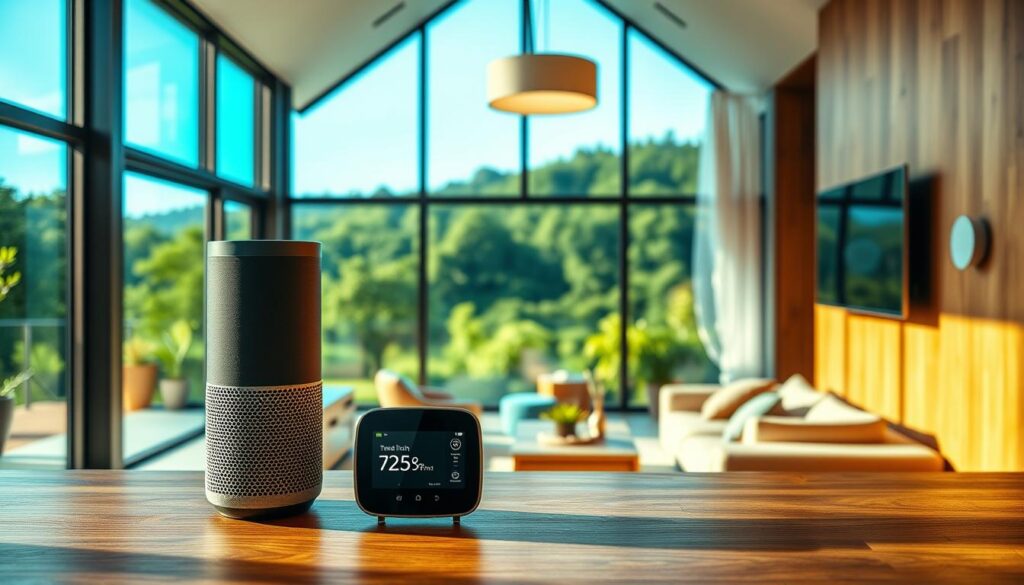
Incorporating Technology Seamlessly
It’s important to add smart home tech smoothly into our homes. We should pick devices that work well and look good. This way, our homes stay functional and stylish.
By adding tech wisely, we can improve our lives without losing style or function. As tech advances, our homes will keep getting better.
Looking ahead, it’s exciting to see how smart home tech will evolve. With new, eco-friendly tech coming, we’re eager to see these changes in our homes.
Minimalism with a Personal Touch
In 2023, we’re seeing a shift towards minimalism that incorporates personal elements, making spaces truly unique. This trend is all about striking a balance between simplicity and personality.
The “Less is More” Approach
At its core, minimalism is about embracing the “less is more” philosophy. This means paring down clutter and focusing on clean lines, simple shapes, and a limited color palette. By doing so, we create a sense of calm and serenity in our homes.
- Simplified decor
- Clean lines and minimal ornamentation
- A focus on functionality
Adding Personal Accessories
While minimalism is about simplicity, it’s not about removing all personality from a space. Adding personal accessories is key to making a minimalist home feel truly yours. This can include family photos, unique decorative pieces, or sentimental objects.
According to Ursula Carmona, Founder of Home Made by Carmona and HomeGoods Style Expert, “Bringing to life a glamorous home in 2023 will be easier and more affordable than ever through the emerging micro-luxury trend, which focuses on decor made with plush, rich materials and texture.” This micro-luxury trend aligns perfectly with minimalist design, as it emphasizes quality over quantity.
Colorful Minimalism for a Fresh Look
For those who think minimalism means a dull, monochromatic space, think again. Colorful minimalism is a growing trend that incorporates bold, vibrant colors into an already simple design. This can be achieved through a statement piece of furniture, a colorful rug, or even a bold accent wall.
- Choose a bold, vibrant color that reflects your personality.
- Incorporate this color through a statement piece or accent wall.
- Balance the bold color with neutral elements to maintain a sense of calm.
For more inspiration on designing a minimalist home with a personal touch, visit Leaceramiche’s guide on minimalist chic surfaces and.
Textural Diversity in Home Interiors
Adding different textures to home decor is making spaces more interesting. The latest trends show that mixing textures is key to great interior design.
Layering Different Materials
Layering materials is a smart way to add texture. Mixing smooth with rough, soft with hard, and matte with glossy creates a lively look.
For example, a sleek sofa with a plush rug and a wooden table with a distressed finish can make a room pop. Interior designer Carrie Livingston says stripes are coming back. This shows how design is always changing.
The Power of Soft Furnishings
Soft furnishings like throw pillows and blankets bring texture to a room. They add comfort and let you play with different materials and patterns.
Using velvet pillows with linen drapes creates a beautiful mix of textures. Soft furnishings also soften the look of hard architectural features, making spaces feel welcoming.
Mixing Textures for Visual Interest
Mixing textures is an art that needs careful thought. It’s about finding a balance that adds interest without being too much. A good mix of textures can make a room more engaging and personal.
| Texture Combination | Description | Effect |
|---|---|---|
| Smooth + Rough | Pairing sleek surfaces with textured elements | Creates contrast and visual interest |
| Soft + Hard | Combining plush furnishings with rigid structures | Balances comfort and durability |
| Matte + Glossy | Balancing flat finishes with shiny surfaces | Adds depth and dynamism |
By embracing textural diversity, homeowners can create spaces that are both beautiful and full of character. As we keep exploring interior design, mixing textures will stay a key trend.
Outdoor Living Spaces: Extending Our Homes
Outdoor areas are now a big part of our homes. We’re turning patios and decks into places for relaxation and fun. This lets us enjoy more space and make our homes bigger.
Functional Outdoor Areas
Creating inviting patios and decks is key. We can add outdoor kitchens and dining spots for meals and parties. Fire pits make these areas cozy, perfect for cold nights and chats.
By using these design trends, we blend indoor and outdoor spaces well. Outdoor areas will keep growing in importance. They offer a peaceful spot and a place to bond with loved ones.
